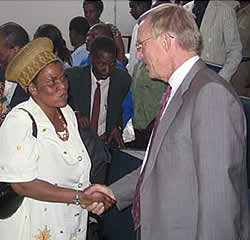|
Back to Index
Swedish
Ambassador re-affirms commitment to working with the government
of Zimbabwe
Africa
University
October 11, 2006
 |
| Swedish
Ambassador to Zimbabwe, Sten Rylander and Mrs. Abigail Damasane,
Deputy Minister of Women's Affairs, Gender and Community
Development. Photo: Victor Babbage |
 The
Swedish Ambassador to Zimbabwe, His Excellency Sten Rylander has
re-affirmed his commitment to working with the government of Zimbabwe,
amid recent claims in the independent media that he has "given
up on Mugabe." The
Swedish Ambassador to Zimbabwe, His Excellency Sten Rylander has
re-affirmed his commitment to working with the government of Zimbabwe,
amid recent claims in the independent media that he has "given
up on Mugabe."
Speaking at
the launch of the Dag Hammarskjöld Commemorative Week at Africa
University in Mutare on 9 October, the ambassador highlighted that
as the representative of the Swedish government in Zimbabwe, he
is prepared to "work with the President of this country"
in building bridges between Zimbabwe and the European Union.
Ambassador Rylander
chronicled the Swedish policy of non-participation in military alliances
and noted that his government has placed a high priority on the
preservation of peace.
"Peace
is more than just the absence of war, it is about transforming our
societies and uniting our global community to work together for
a more peaceful, just and sustainable world," said Rylander.
In his remarks,
Ambassador Rylander also highlighted Sweden’s long-standing commitment
to and support for efforts to empower women. Issues pertaining to
the marginalization of women are given high priority in his government’s
policy–making processes.
"Sweden
recognizes that women’s equality is the cornerstone for sustainable
peace and justice," said Rylander.
Speaking at
the same event, the Deputy Minister of Women’s Affairs, Gender and
Community Development, Mrs. Abigail Damasane challenged participants
to advocate for stronger participation of women in decision-making
positions and processes and to also follow in the footsteps of former
United Nations Secretary General Dag Hammarskjöld, who was
a very committed ambassador of peace and goodwill throughout his
life.
"The equality
of men and women remains the only precursor to a sustainable, just
and developed society," she said.
Mrs. Damasane
focused her remarks on international legal instruments which have
been adopted to secure women’s right to vote, protect non-combatant
women in armed conflict, provide for more equitable access to education
and health and increase the sharing of power and resources. She
applauded the appointment of women to decision-making positions
in countries such as Zimbabwe, South Africa, Liberia and Mozambique.
"We need to continue the process relentlessly to ensure our
elevation is for posterity," said Damasane.
The security
of women, she noted, remains at the mercy of structural defects
in society. As a result of patriarchy, women are still subject to
negative cultural practices such as early and forced marriages,
wife inheritance and female genital mutilation. "Even in the
confines of their homes, women are still subject to violence and
abuse" and there is need for laws which protect the rights
of women, said Damasane.
A Zimbabwean
response to these concerns is the Domestic
Violence Bill, which is at its second reading in Parliament.
It is an important legal instrument through which Zimbabwean women
would be protected by law, noted Damasane. She urged Africa University’s
students to lobby for the bill, saying
"I have
no doubt that it (the Bill) will be passed into law in the very
near future and every woman on this land will be protected against
various forms of abuse."
The Embassy
of Sweden in Zimbabwe is co-hosting the Dag Hammarskjöld Commemorative
activities taking place at Africa University from the 9th
to the 13th of October 2006. The week-long commemoration
features seminars, cultural performances and major presentations
from senior government officials, diplomats, academics and heads
of organizations.
In his welcome
remarks during the opening ceremonies, Africa University’s Vice
Chancellor, Professor Rukudzo Murapa emphasized his institution’s
desire to serve as a focal point for expertise in issues of gender,
peace and development.
The Dag Hammarskjöld
Commemorative Week 2006, he said, raises public awareness of these
issues and provides the opportunity for serious reflection on current
efforts to build sustainable peace and development in Africa. Seminar
presentations over the course of the week will focus on peace-building
efforts in Darfur, northern Sudan and in the Democratic Republic
of Congo.
Visit the Africa
University fact
sheet
Please credit www.kubatana.net if you make use of material from this website.
This work is licensed under a Creative Commons License unless stated otherwise.
TOP
|

